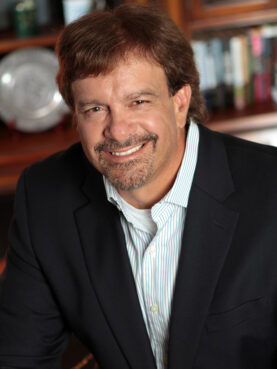(RNS) — A popular guide for biblical counseling co-authored by Christian counseling expert Tim Clinton has been taken off the market after a failed attempt to address allegations of plagiarism with a revised edition.
“The Quick-Reference Guide to Biblical Counseling has been put out of print in every edition and every format,” Bob Gaudet, executive vice president of marketing and publicity for the Baker Publishing Group, told Religion News Service in an email.
Gaudet declined to comment on why the book was withdrawn.
First published by Baker in 2009, The Quick-Reference Guide to Biblical Counseling, by Tim Clinton, president of the American Association of Christian Counselors, and Ron Hawkins, a former Liberty University professor and dean, was updated in 2024 to properly cite sources. Critics have alleged previous versions of the book included work from other authors without attribution.
However, according to a letter from Baker’s editorial director to Clinton’s agent, many of the citations meant to address those concerns never made it into the updated edition, which was published in August 2024.
Tom Winters, Clinton’s agent, said the citations to the updated version were left out during Baker’s editorial process. Winters also said that “some mistakes were made” in the earlier edition of the book and that to address those mistakes, Clinton and Hawkins “cleaned up” the manuscript with the correct citations.
“I guess sometimes the train gets off the track and you can’t get it back on somehow,” Winters told RNS. He also provided a letter from Brian Vos, editorial director of Baker, which stated that the authors provided an updated manuscript and that “many of the citations were omitted during the editorial process at Baker.”
“That was clearly a misunderstanding and a mistake,” Vos wrote. “Each and every one of the callouts that Tim Clinton and Ron Hawkins provided should have been in the final product. We regret the error.”
Hawkins declined to comment, saying RNS had been made aware of what went wrong with the book.
RELATED: The sin and crime of plagiarism in Christian publishing
Concerns about alleged plagiarism have long been an issue in Christian publishing. In 2013, megachurch pastor Mark Driscoll was accused of plagiarizing parts of his book “A Call to Resurgence.” His publisher reviewed the book and said no plagiarism was found, while Driscoll admitted “mistakes were made.” In 2018, Zondervan, a major Christian publisher, settled a lawsuit over plagiarism and copyright infringment. In 2017, Abingdon Press withdrew a devotion written by Hillary Clinton’s pastor after plagiarism was discovered.
Tim Clinton, an evangelical and outspoken supporter of President Donald Trump, has been criticized for alleged plagiarism and missing citations in his books and articles, something he has denied in the past. In 2018, a spokesman for Clinton denied plagiarism, telling Inside Higher Ed that Clinton, a former Liberty University professor, “has a zero-tolerance policy for plagiarism.”
The spokesman also said Clinton often worked with research assistants and graduate students and blamed a former employee for the alleged plagiarism.

Tim Clinton. (Courtesy photo)
Clinton, who now runs a center for Liberty University, was also accused of plagiarism in a 2023 lawsuit filed by Houston Christian University. The lawsuit arose from failed plans to have the American Association of Christian Counselors — a for-profit company owned by Clinton that provides resources and runs conferences — design classes and recruit students for the school. A complaint filed in the case, which was eventually settled, claimed the university had looked into allegations against Clinton and found that his actions “constituted acts of plagiarism.”
Aaron New, a former Christian college professor, has had concerns about Clinton’s work since 2018, when he came across an article Clinton wrote about the 1980 U.S. Olympic hockey team. The article — about overcoming hardship — borrowed heavily from another writer’s work without attribution, said New.
At the time, New was teaching psychology and counseling at Central Baptist College in Arkansas and owned a number of Clinton’s books, as well as resources from the American Association of Christian Counselors.
New told RNS in an email that he has found more than 100 examples of Clinton using other people’s work without attribution in his books and articles. He wrote to Baker earlier this year, alleging plagiarism in The Quick-Reference Guide to Biblical Counseling.
“Pulling the book is the right thing to do and I’m glad Baker has done so,” he wrote. “And while it is clear to me that the reason for pulling the book is due to problems of plagiarism, I wish Baker would be more forthcoming to the public about their rationale.”
New also believes the same kinds of issues he found in The Quick-Reference Guide to Biblical Counseling exist in other books from Clinton that Baker publishes, and New hopes those books will be pulled as well.
Author and blogger Warren Throckmorton, a retired Grove City College psychology professor, said Clinton and his co-author share the blame for missing attributions in the book. As part of the publishing process, authors get several chances to review a book manuscript before it’s published, especially when changes are made.
“The author should have looked at this book,” said Throckmorton. “Unless you allege the publisher took out the citations on purpose, you can’t pass it off on the publisher to be responsible for your mistake.”
Throckmorton, a former member of the American Association of Christian Counselors’ advisory board, said that in the past, Baker has been more forthcoming when a book was pulled. He pointed to a case in 2017, when Baker’s academic arm pulled a commentary by biblical scholar Andreas Köstenberger after the scholar admitted he had used material from D.A. Carson without attribution. Baker sent out a press release, said Throckmorton, and offered to make things right with customers. Köstenberger, according to a copy of that press release, took responsibility for the issues of the book.
No such public statement from Baker was made in the case of the guide co-authored by Clinton.
Winters declined to comment on concerns with Clinton’s other works, saying he did not know enough about the concerns to address them. He said Clinton and Hawkins may find another publisher for their guide, or they may end up self-publishing the book in the future. (The guide was originally published by the American Association of Christian Counselors in 2007.) Winters said the missing citations are “one of those things that should never have happened.”
“But unfortunately, it was the second time for this thing,” he said. “It was a nightmare to be honest with you, from what I understand.”
RELATED: Dale Partridge, Christian ‘influencer’ and church planter, haunted by plagiarism claims



